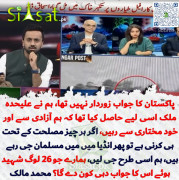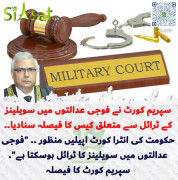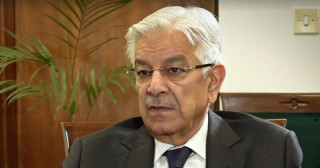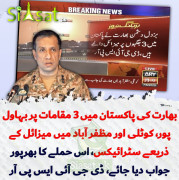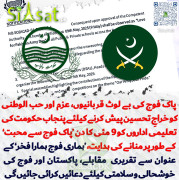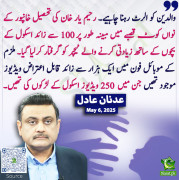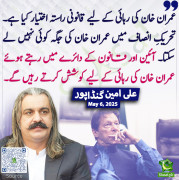[video]http://www.youtube.com/watch?v=3nCCKHC4uqE[/video]

The British Transport Secretary said last week that images taken by new full-body X-ray scanners, which capture the human anatomy in detail, would be destroyed immediately and not pose a risk to travellers' privacy.
But Indian actor Shah Rukh Khan has debunked the government's claims, telling BBC talk show host Jonathan Ross that he autographed printed scans of his own body for two female security officers.
"I came out [of the scanner] and then I saw these girls and they had these printouts," Khan said.
"So I looked at them, I thought maybe it's a form you're supposed to [sign] ... and you could see everything inside.
"And then I've autographed them for them."
The scanners are in use at Heathrow and Manchester airports, with Birmingham airport set to follow suit later this month.
Australian airports will adopt them progressively this year, federal Transport Minister Anthony Albanese said this week.
They will only be used on passengers departing internationally and not all travellers will be scanned.
British Transport Secretary Andrew Adonis told the BBC last week the new system was the same as a "pat-down" search.
"A pat-down search is a pretty intrusive procedure but people accept that because it is important that we do detect whether there are weapons or other powerful substances that people may be carrying," he said.
"A body scanner is in the same category - it is very important to stress that the images which are captured by body scanners are immediately deleted after the passenger has gone through the body scanner.
"Staff are, of course, properly trained and supervised who manage the body scanners."
-------------------------------------------------------------------------------------------
The Full Body Security Scanners (also called Nude-body scanners) are being installed at various airports in United States and Europe . Several human rights and religious groups have expressed their concerns and disapproval of such scanners on the grounds of violation of privacy and human dignity.
The Fiqh Council of North America (FCNA) emphasizes that a general and public use of such scanners is against the teachings of Islam, natural law and all religions and cultures that stand for decency and modesty.
It is a violation of clear Islamic teachings that men or women be seen naked by other men and women. Islam highly emphasizes haya (modesty) and considers it part of faith. The Quran has commanded the believers, both men and women, to cover their private parts. Human beings are urged to be modest in their dress.
See Holy Quran, 7:26-27; 24:30-31; 33:59.
Exception to this rule can be made in case of extreme necessity, such as medical treatment, to investigate a crime or in a situation of imminent danger. There must be a compelling case for the necessity and the exemption to this rule must be proportional to the demonstrated need.
FCNA fully supports the necessary measures for the safety and protection of all passengers. It is, however, deeply concerned about the use of nude body scanners for this purpose. FCNA recommends that instead of producing and displaying a picture of the body, software should be designed to produce only the picture of questionable materials on an outline of the body.
Further, other technologies could be used that detect the presence of explosives without infringing on modesty as some European leaders have pointed out.
FCNA appreciates the alternate provision of pat-down search (when needed) and therefore recommend to Muslims to avail this option over the nude body scanners.

The British Transport Secretary said last week that images taken by new full-body X-ray scanners, which capture the human anatomy in detail, would be destroyed immediately and not pose a risk to travellers' privacy.
But Indian actor Shah Rukh Khan has debunked the government's claims, telling BBC talk show host Jonathan Ross that he autographed printed scans of his own body for two female security officers.
"I came out [of the scanner] and then I saw these girls and they had these printouts," Khan said.
"So I looked at them, I thought maybe it's a form you're supposed to [sign] ... and you could see everything inside.
"And then I've autographed them for them."
The scanners are in use at Heathrow and Manchester airports, with Birmingham airport set to follow suit later this month.
Australian airports will adopt them progressively this year, federal Transport Minister Anthony Albanese said this week.
They will only be used on passengers departing internationally and not all travellers will be scanned.
British Transport Secretary Andrew Adonis told the BBC last week the new system was the same as a "pat-down" search.
"A pat-down search is a pretty intrusive procedure but people accept that because it is important that we do detect whether there are weapons or other powerful substances that people may be carrying," he said.
"A body scanner is in the same category - it is very important to stress that the images which are captured by body scanners are immediately deleted after the passenger has gone through the body scanner.
"Staff are, of course, properly trained and supervised who manage the body scanners."
-------------------------------------------------------------------------------------------
The Full Body Security Scanners (also called Nude-body scanners) are being installed at various airports in United States and Europe . Several human rights and religious groups have expressed their concerns and disapproval of such scanners on the grounds of violation of privacy and human dignity.
The Fiqh Council of North America (FCNA) emphasizes that a general and public use of such scanners is against the teachings of Islam, natural law and all religions and cultures that stand for decency and modesty.
It is a violation of clear Islamic teachings that men or women be seen naked by other men and women. Islam highly emphasizes haya (modesty) and considers it part of faith. The Quran has commanded the believers, both men and women, to cover their private parts. Human beings are urged to be modest in their dress.
See Holy Quran, 7:26-27; 24:30-31; 33:59.
Exception to this rule can be made in case of extreme necessity, such as medical treatment, to investigate a crime or in a situation of imminent danger. There must be a compelling case for the necessity and the exemption to this rule must be proportional to the demonstrated need.
FCNA fully supports the necessary measures for the safety and protection of all passengers. It is, however, deeply concerned about the use of nude body scanners for this purpose. FCNA recommends that instead of producing and displaying a picture of the body, software should be designed to produce only the picture of questionable materials on an outline of the body.
Further, other technologies could be used that detect the presence of explosives without infringing on modesty as some European leaders have pointed out.
FCNA appreciates the alternate provision of pat-down search (when needed) and therefore recommend to Muslims to avail this option over the nude body scanners.

